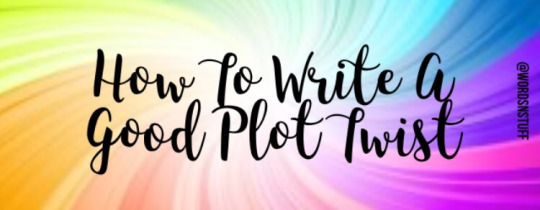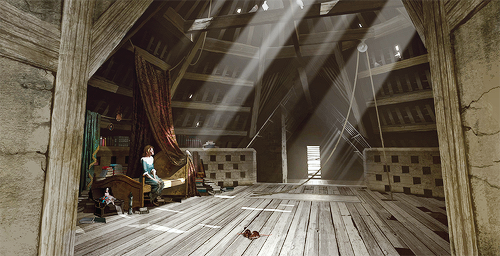Text
If you write a strong character, let them fail.
If you write a selfless hero, let them get mad at people.
If you write a cold-heated villain, let them cry.
If you write a brokenhearted victim, let them smile again.
If you write a bold leader, let them seek guidance.
If you write a confident genius, let them be wrong, or get stumped once in a while.
If you write a fighter or a warrior, let them lose a battle, but let them win the war.
If you write a character who loses everything, let them find something.
If you write a reluctant hero, give them a reason to join the fight.
If you write a gentle-hearted character who never stops smiling, let that smile fade and tears fall in shadows.
If you write a no one, make them a someone.
If you write a sibling, let them fight and bicker, but know that at the end of the day they’ll always have each other’s back.
If you write a character, make them more than just a character; give them depth, give them flaws and secrets, and give them life.
77K notes
·
View notes
Text
Villain
Your villain is an adult female who was injected with something by mad scientists before birth.
Your villain was born secretly.
They are the third child born to their parents.
Your villain is a muscular villain, with a fear of snakes.
They survive in their ‘public life’ by their reputation and in their secret villain life with their ability to fool their enemies.
Your villain’s super power comes from telekinesis, when it works as wanted, otherwise things can get… painful.
Anything can trigger your villain, but if it involves environmental destruction, nothing will stop them in their goals.
Their secret villain identity is unpopular.
Their works as a villain are misattributed in the news. Your villain pays a lot of money to make sure that happens.
Source: Feath
32 notes
·
View notes
Text
Civilization
Time Period: Modern
Shaping Force: Magic
Population: Mainly nonhuman races
Politics
Political Structure: oligarchy - theocracy
Strong Influence: popular support
Popular Issue: technology
Stability: extremely stable
Personal Freedoms: good
Scandals: rare
Foreign Relations: somewhat good
Economy
Main Resource: mining - metals
Main Export: resource-related
Main Import: food-related
Trade: major surplus
Strength: very weak and declining
Wealth: fairly even, but with a wealth gap
Ecology
Main Climate: desert
Ocean: none
Mountains: none
Frequent Trouble: windstorms
Wilderness: 19%
Wild Animals: very rare
Natural Resources: scarce
Culture
Highly Values: social status
Known For: natural vistas
Popular Entertainment: theatre
Respected Profession: artisan
Discrimination: virtually none
Major Taboo: eye contact
Major Social Ill: infidelity
Military
Strength: very strong
Focus: land
Main Unit: commandos
Soldiers: volunteers
Main Use: foreign peacekeeping
Rank: granted by superiors
Magic
Occurrence: widespread
Source: runs in families
Major Use: law enforcement
Viewed: with respect
Enchanted Items: common
Religion
Type: pantheism
Focus: personal spirituality
Worship: joyous public sacrifice by priests
Associated Artform: poetry/psalms
Prevalence: believed by some
Holidays: often
Population
Urban: 57%
Rural: 43%
Literacy Rate: 68%
Gender Ratio: 0.98 male(s)/female
Fertility Rate: 2.3 children/family
Life Expectancy: 78.5 years
Source: Chaotic Shiny
17 notes
·
View notes
Photo

Table of Contents:
Part One: The Right Way to Build Worlds
Part Two: Intuition and Logic
Part Three: Study –and Ask Why?
Part Four: How to Begin Building Your World
Part Five: Growing Out
Part Six: Growing Out World
Part Seven: Growing Out People
Part Eight: Growing Out Living
Part Nine: Growing Out the Little Things
Part Ten: The Effect of More
Part Eleven: Stop World Building Already
Part Twelve: Trust Your Readers
Part Thirteen: Stay Limber, Writers
Part Fourteen: Navigating Stereotypes
(Note from Pear: This series is indefinitely open to new posts. As they are added, this post will be updated. Like always, you can find original content in the posts by pear tag and the table of contents tag for series.)
4K notes
·
View notes
Text
Character Development Questions: Hard Mode
Does your character have siblings or family members in their age group? Which one are they closest with?
What is/was your character’s relationship with their mother like?
What is/was your character’s relationship with their father like?
Has your character ever witnessed something that fundamentally changed them? If so, does anyone else know?
On an average day, what can be found in your character’s pockets?
Does your character have recurring themes in their dreams?
Does your character have recurring themes in their nightmares?
Has your character ever fired a gun? If so, what was their first target?
Is your character’s current socioeconomic status different than it was when they were growing up?
Does your character feel more comfortable with more clothing, or with less clothing?
In what situation was your character the most afraid they’ve ever been?
In what situation was your character the most calm they’ve ever been?
Is your character bothered by the sight of blood? If so, in what way?
Does your character remember names or faces easier?
Is your character preoccupied with money or material possession? Why or why not?
Which does your character idealize most: happiness or success?
What was your character’s favorite toy as a child?
Is your character more likely to admire wisdom, or ambition in others?
What is your character’s biggest relationship flaw? Has this flaw destroyed relationships for them before?
In what ways does your character compare themselves to others? Do they do this for the sake of self-validation, or self-criticism?
If something tragic or negative happens to your character, do they believe they may have caused or deserved it, or are they quick to blame others?
What does your character like in other people?
What does your character dislike in other people?
How quick is your character to trust someone else?
How quick is your character to suspect someone else? Does this change if they are close with that person?
How does your character behave around children?
How does your character normally deal with confrontation?
How quick or slow is your character to resort to physical violence in a confrontation?
What did your character dream of being or doing as a child? Did that dream come true?
What does your character find repulsive or disgusting?
Describe a scenario in which your character feels most comfortable.
Describe a scenario in which your character feels most uncomfortable.
In the face of criticism, is your character defensive, self-deprecating, or willing to improve?
Is your character more likely to keep trying a solution/method that didn’t work the first time, or immediately move on to a different solution/method?
How does your character behave around people they like?
How does your character behave around people they dislike?
Is your character more concerned with defending their honor, or protecting their status?
Is your character more likely to remove a problem/threat, or remove themselves from a problem/threat?
Has your character ever been bitten by an animal? How were they affected (or unaffected)?
How does your character treat people in service jobs?
Does your character feel that they deserve to have what they want, whether it be material or abstract, or do they feel they must earn it first?
Has your character ever had a parental figure who was not related to them?
Has your character ever had a dependent figure who was not related to them?
How easy or difficult is it for your character to say “I love you?” Can they say it without meaning it?
What does your character believe will happen to them after they die? Does this belief scare them?
132K notes
·
View notes
Text
Character Sheet
Name:
Role:
Age:
Gender:
Sex:
Sexuality:
Social Class:
Personality:
Appearance:
Background:
Hobbies:
Quirks:
Education:
Occupation:
Aspirations:
Birth town and Current Location:
Birthday:
1K notes
·
View notes
Text
Tips for Writing Magic
So, as we all know, there are many different kinds of magic — and more being discovered every day as writers create them. It’s true that every world as different and therefore each type of magic created will be different, but following a few of these tips can help you flesh it out just a bit more.
1. Consider your world’s history. Were there ever any major events involving magic or knowledge of it? How has magic proven useful in the past? How much has your culture changed since that time; are its past uses still applicable? Has there been a history of more powerful people having a possession or knowledge of magic?
2. Decide how magic is seen through the eyes of the people. Is it taboo? Dangerous? Helpful? Is it a practice that has to be kept in secret or can it be done anywhere? Are there certain places for it? Consider the people with more knowledge of it: are they seen as wise or dangerous? Are there people with professions dedicated to it?
3. Determine its use in everyday life. Is it used to help complete regular tasks? What about in education? If your world has an education system, what is magic’s importance within it? Are there everyday items that posses magic? Are these items considered benevolent or evil? Can items be enchanted to help around the house, or is magic reserved only for things of major importance?
4. Think about the people using it. Is there a general age range for people using it? If the range is broad, are there common uses for each age group? More than age, is there a general social status of people with access to it? Is there a stereotype that follows these people? Or a wealth level? Or even an appearance?
So, those are all the magic tips I’ve got for you today. If you’d like to see me cover a topic, be sure to drop a message in my ask box; see you next time with another writing post!
9K notes
·
View notes
Text
How To Write A Good Plot Twist
Here’s a guide for all you writers who like to screw around with their readers;)

1. Give it an open ending.
Not necessarily the easiest, but one of the most practical plot twists is the ambiguous ending. It is a good one to use if you don’t want your overall storytelling to be affected by your plot twist too much.
When you leave a story open ended, this means you don’t explain how the story ends, but rather, you leave it up to the imagination of the reader.
The audience doesn’t know what happened to the characters in the end, but based on the story and what has occurred thus far, they can wager a guess and infer an ending in order to satisfy their need to tie up the loose ends in their minds.
2. Use an untrustworthy narrator.
This is a great technique to use because people are often conditioned to take the narrator’s word when reading a story. The narrator is the perfect character to use in order to confuse the reader, and maybe give them hints and suggestions that will lead them to a completely different conclusion from the one that you are setting up for your plot twist.
If you are going to use this method, however, it’s important to not make it glaringly obvious that the narrator is untrustworthy in telling the story. You should be foreshadowing it subtly, but the story that the narrator is telling must also be completely believable.
When used effectively, the reader will be very surprised at the plot twist, but will also have a feeling of “I should have seen it coming,” as well.
3. Reverse character roles.
A pretty straightforward approach, this is when your plot twist consists of either the hero turning into the villain or vice versa.
Sometimes it comes off forced when the character becomes a polar opposite of what he or she has been throughout the story, so it is best to give these characters some traits that would make their transitions believable.
4. Throw your reader into the mix.
A good way to make plot twists work well is by starting the storytelling in the middle of some type of climax. When you do this, you are giving the reader an immediately intriguing plot that could really go anywhere, because there is no backstory to reference.
The lack of prior information about the situation given to the reader gives the writer a lot of freedom with the plot twists that he or she plans.
5. Try an unexpected kill.
Your readers might hate you for a short while, but this technique provides an unexpected plot twist.
Killing off one of the main characters in the middle of the story is something that always comes as unexpected. Readers pick up on who the key characters are early in the story if they are well-developed, and they attach to these characters early on in the story.
Having one of these main characters die really twists things into an unexpected direction, because the reader is already looking forward to what will happen to this character at the end of the story. Finding out that this character will not be playing any type of role in the story’s ending is always a good shock for the reader.
These are only a few suggestions. There are many other great ways to introduce plot twists into your stories, which can help you to take your writing into a completely new direction.
Source x
1. Eliminate the obvious
When coming up with the climax to your story, discard every possible solution you can think of for your protagonist to succeed.
Then think of some more.
And discard those, too.
You’re trying to create an ending that’s so unforeseen that if a million people read your book, not one of them would guess how it ends (or how it will get to the end), but when they finally come to it, every one of those people would think,Yes! That makes perfect sense! Why didn’t I see that coming?
The more impossible the climax is for your protagonist to overcome, the more believable and inevitable the escape or solution needs to be. No reader should anticipate it, but everyone should nod and smile when it happens. No one guesses, everyone nods. That’s what you’re shooting for.
While writing, ask yourself:
What do I need to change to create a more believable world for each separate twist I’m including?
How can I drop the gimmicks and depend more on the strength of the narrative to build my twist?
Will readers have to “put up with” the story that’s being told in anticipation of a twist ending, or will they enjoy it even more because of the twist? How can I improve the pretwist story?
How can I make better use of the clues that prove the logic of the surface story to create the twist and bring more continuity to the story—but only after the twist is revealed?
2. Redirect suspicion
When you work on your narrative, constantly ask yourself what readers are expecting and hoping for at this moment in the story. Then keep twisting the story into new directions that both shock and delight them.
To keep readers from noticing clues, bury them in the emotion or action of another section. For example, in an adventure novel, offhandedly mention something during a chase scene, while readers’ attention is on the action, not the revelation. Use red herrings, dead ends, and foils. Bury clues in discussions of something else.
While writing, ask yourself:
How can I do a better job of burying the clues readers need to have in order to accept the ending? Where do I need to bring those clues to the surface?
How can I play expectations based on genre conventions against readers to get them to suspect the wrong person as the villain or antagonist?
3. Avoid gimmicks
Readers want their emotional investment to pay off. The twist should never occur in a way that makes them feel tricked, deceived, or insulted. Great twists always deepen, never cheapen, readers’ investment in the story.
This is why dream sequences typically don’t work—the protagonist thinks she’s in a terrible mess, then wakes up and realizes it was all just a dream. These aren’t twists because they almost never escalate the story but often do the very opposite, revealing to readers that things weren’t really that bad after all (de-escalation). Showing a character experiencing a harrowing or frightening experience and then having him wake up from a dream is not a twist; it’s a tired cliché.
How do you solve this? Simply tell the reader it’s a dream beforehand. It can be just as frightening without de-escalating the story’s tension, and it can also end in a way that’s not predictable.
While writing, ask yourself:
Will readers feel tricked, deceived, or insulted by this twist? If so, how can I better respect their ability to guess the ending of my story?
Have I inadvertently relied on clichés or on any plot turning points that have appeared in other books or movies? How can I recast the story so it’s fresh and original?
4. Write toward your readers’ reaction.
The way you want your readers to respond will determine the way you set up your twist. Three different types of twists all result in different reactions by readers: (1) “No way!” (2) “Huh. Nice!” and (3) “Oh, yeah!”
When aiming for the “No way!” response, you’ll want to lead readers into certainty. You want them to think that there’s only one possible solution to the story.
The more you can convince them that the story world you’ve portrayed is exactly as it appears to be—that only one outcome to the novel is possible—the more you’ll make their jaws drop when you show them that things were not as they appeared to be at all. If the twist is satisfying, credible, and inevitable based on what has preceded it, readers will gasp and exclaim, “No way! That’s awesome! I can’t believe he got that one past me.”
With the “Huh. Nice!” ending, you want to lead readers into uncertainty. Basically, they’ll be thinking, “Man, I have no idea where this is going.” When writing for this response, you’ll create an unbalanced, uncertain world. You don’t want readers to suspect only one person as the villain but many people. Only when the true villain is revealed will readers see that everything was pointing in that direction all along.
Finally, if you’re shooting for the “Oh, yeah!” reaction, you’ll want to emphasize the cleverness with which the main character gets out of the seemingly impossible-to-escape-from climax. Often we do that by allowing him to use a special gift, skill, or emblem that has been shown to readers earlier but that they aren’t thinking about when they reach the climax. Then, when the protagonist pulls it out, readers remember: “Yes! That’s right! He carries a can of shark repellent in his wet suit! I forgot all about that!”
Relentlessly escalate your story while keeping it believable, surprising, and deeper than it appears.
While writing, ask yourself:
If I want to shock readers with the twist, have I led them into certainty as they try to predict the ending?
If I want readers to suspect a number of different endings, have I satisfactorily built up all the potential outcomes?
If I want readers to cheer at the ending, have I (1) created a seemingly impossible situation for the protagonist to escape from or conquer or (2) allowed the protagonist to persevere through wit or grit rather than with the help of someone else (that is, deus ex machina)?
Source x
1. Plot twists must be unique
The requirement of any good plot twist is that it must have a reasonable shot at surprising readers. That’s kind of the point, right? If readers figure it out ahead of time, they’re not going to be surprised. This means you can’t pull the same old gag and expect readers to blithely fall for it. When Barry Levinson’s Bandits reaches its climax with the two best friend main characters apparently killing each other during a bank hold-up, I didn’t buy it. Going into that scene, I had already figured out this was just a poor man’s The Sting. Yawn.
2. Plot twists must be executed cleverly
Again, the point is to catch readers off guard. In order to do that, you have to properly set up the twist. You have to foreshadow it just enough to make it all make sense after the payoff. But you can’t tip your hand too broadly—or readers will figure it out. Another twist I saw coming was that found in Neil Burger’s The Illusionist. After all, the main character is a magician. What else are readers to expect but a magic trick?
In comparison, Rian Johnson’s The Brothers Bloom, about a pair of con artists, could easily have inspired the same hyper-awareness. But the twist in its ending was so perfectly foreshadowed and so expertly executed that I almost didn’t believe it even after I’d seen the proof to back it up.
(If you want to learn how to properly foreshadow events in your writing, check out THIS POST all about it!)
3. Plot twists must advance the plot
Plot twists must be about more than fooling readers. There has to be a point to it all. Why is this deception going on under the surface? Why are the characters fooling the readers as well as, presumably, other characters? The elaborate deception in Christopher Priest’s The Prestige, the revelation of truth at the end of Orson Scott Card’s Ender’s Game, and the celebrated twist in M. Night Shymalan’s The Sixth Sense are all like the dot at the end of an exclamation point. They’re not twists just for the sake of a twist; they’re there to explain the plot itself.
4. Plot twists must create interesting story situations
Most importantly of all, plot twists have to be able to create situations that readers will be excited to read about. If (horror of horrors) someone figures out your twist ahead of time, that twist still needs to be able to create such an interesting story situation that, instead of being disappointed, readers will be super-excited about the possibilities. Instead of saying, “Darn, I figured it out,” you want them to say, “Oh, baby, please let that be what it is!” Who wasn’t excited by the possibilities when Darth Vader turned out to be Luke’s father? When I figured out the twist in Brent Weeks’s The Black Prism, I couldn’t wait for it to pan out. The results of the twist were even better than the twist itself.
5. Plot twists must not take away from re-readability
If the focus is so tight on the twist itself that the story loses its oomph once readers figure out what’s going on, then you know something is wrong. The sign of a good story is that readers will love it just as much (if not more) when they enter it for a second time knowing how everything pans out. This is exactly how I feel about Brent Weeks’s twist in Beyond the Shadows, when readers (and the protagonist) discover that certain decisions the protagonist has been making throughout the book have been having unforeseen consequences all along.
Source x
50 Plot Twist Ideas
Someone important to the action is poisoned.
Give a minor character an unshakable faith in something that the main character doesn’t believe in. How does this set them at odds?
A case of mistaken identity: Someone mistakes your main character for an important cultural icon, a known villain, a spy, or someone from their past. Shenanigans ensue…
The place that your character was just traveling toward–whether it was the kitchen, the school, or another city–suddenly no longer exists.
Startling, direction-altering information is brought to your characters’ attention by … an animal.
The next step for your main characters is revealed to one of them, with crystal clarity, in a dream. Only … it turns out that the dream was wrong.
Your character is locked in a prison of some kind. The only way to get the key is by singing.
Set an important scene in an art museum. One of the paintings or sculptures reminds your character of something important, long forgotten.
A rumor gathers momentum and ugliness. It soon divides your main character from her allies.
The only one they can trust right now is a con man.
A coin toss takes on tremendous importance.
A character is suddenly inducted into a secret society. Will the other members of the society be the worst sort of antagonists, or unexpected allies?
It was the last thing they ever expected to find in the kitchen.
What character does your protagonist most revere? And what happens when she finds out that that character isn’t all she thought?
An unexpected gift seems like a wonderful present at first. But it quickly becomes a source of damage, chaos, and grief.
The only one who (grudgingly) agrees with your main character is his least favorite person. Now they’ll have to work together.
Their next bit of insight, or their next clue, comes from an important historic figure.
Your characters have to escape into a garden… Which, it turns out, is full of something other than flowers and plants.
There’s a word no one should say. Or a name that no one will mention. A place nobody talks about. Or a proverb that no one repeats. … Except for your main character, who totally goes for it.
Two characters fight over where they’re each going to sit. It gets out of hand … fast.
The next calm scene is interrupted by water: a flood, a leak, rain coming through the windows, an overflowing bathtub, a spilled teacup…
Some part of your character’s life, something she has taken for granted all this time, turns out to be a message for her, in code.
Someone from the character’s past shows up out of the blue, intent on revenge.
No one’s ever eavesdropped quite like this before… Your character is forced to stay in a painful or precarious position to hear what he desperately needs to know.
Some part of your cast now has to rely on an unusual (for them, at least) method of travel. A reindeer, or hot air balloon, or roller skates…
Your characters are somehow forced to interrupt a funeral. One of the mourners provides them with unexpected wisdom.
Your villain becomes obsessed with knock-knock jokes. Her alarmed second-in-command plots a coup.
They unexpectedly find their dream house. And it changes everything.
Just when they couldn’t slow down, your characters get caught in a local celebration, festival, or holiday.
That terrible fear that your main character has been nursing, and having nightmares about… Yeah. If he doesn’t face it now, he’ll lose everything.
An essential character steadily refuses to talk to your main character. For reasons that no one can understand. (Yet.)
They come across a chair with magical or mythical properties. Does your character sit in it, or not?
Whatever problem your characters are facing, they cure it with salt water: sweat, or tears, or the sea.
Just when your characters thought they could relax, the roof falls in. (Or a tree limb drops. Or the tent collapses. Or the mine caves in.)
To stave off certain doom, your character has to invent an elaborate story.
A minor character falls in love with the worst sort of person for her, at the worst possible time.
The next stage of your characters’ plans are thwarted by a massive insect attack. (Ew.)
Whatever tool or skill or technology your characters were most relying on–it breaks. It stops working. It’s faulty. Now what?
Something disagreeable surfaces in your protagonist’s bowl of soup.
It turns out that all the old tales about this time of day, or this character, or this place, or this tradition, were true. And that is very bad news.
Your characters knew that they were running out of time. New information cuts their remaining time in half. This forces your characters to rely on someone they know to be untrustworthy…
If you haven’t killed off a minor character yet… do it. If you have killed one, try resurrecting him, one way or another.
And then they find an old letter, with terrible implications for them, for what they’re about to do, and who they’re up against.
Your characters (either the good guys or the bad guys) interrupt a play, concert, recital, movie, or sporting event, and demand help from the entire audience.
Someone falls: through the flooring, through the ice, into quicksand, through the stairs. Wherever they are, the ground gives way.
Something irresistible tempts your main character, but if she gives in now, she loses everything. How does she fight it?
A barrier that everyone counted on–whether physical, mental, social, financial or emotional–gives way. In the chaos, what does your character do?
Time for a natural disaster. Storm, flood, fire, earthquake, avalanche… Send your characters scrambling.
To move forward, your main character must travel to a place to which he swore he’d never return.
Your main character risks everything to save someone weaker than herself.
Source x
3K notes
·
View notes
Photo

General
Magical World Builder
Fantasy Random Generator (From Quests to Coats of Arms)
Random Adventure Generator
Five Foundations of World-building
On Dothraki and House Elves: Developing Fantasy Cultures
5 FANTASY RESEARCH TIPS & RESOURCES
Character Generator
World-Building for Fantasy Authors
WHERE. R. U? – CREATING A FANTASY WORLD
Worldbuilding (8 Parts)
Questionnaires
Creating a Believable World
Fantasy Worldbuilding Questions
World Building Questionnaire
20 World Building Questions for Authors to Ask Themselves
13 Worldbuilding Questions
World Building Basic Worksheet
5 Tips: World-Building Template
Fantasy World Building Worksheet
Creating Your Magical World Workshop
Language
Creating a Language: Start at the beginning (Part 1 of 7)
The Language Creation Kit
Religion
World Building: Fantasy Religion Design Guide
Creating God: Religion on Fantasy Part 1 (of 4)
Fantasy Religion Questionnaire
Religion Gen
Maps
World Maker
Map Generator
Fantasy World Generator
Map Creator
10 Rules For Making Better Fantasy Maps
How a Map Can Save Your Story
Names
Fantasy Name Generators
Fantasy Name Generator
Fantasy Name Generator
Place Name Generator
Fantasy Name Generator
City & Town Name Generator
Town Name Generator
Natural Terrain Feature Name Generator
Fantasy Creatures
Tips to Create Better & More Believable Fantasy & Science Fiction Species
10 Steps to Creating Realistic Fantasy Animals
Tutorial on creature design
Switch Zoo
Invent Your Own Mythical Creature!
Legendary Creature Generator
Creature Feature Generator
Evil Animal Minion Generator
Humorous Monster Generator
Kaiju Generator
Fantasy/Mythical Animal Generator
The Monster Generator
Mythical & Fantasy Creatures
Magic
How To Worldbuild Magic: Short Rules for Real Worlds
Creative Uses of Magic in Your Fantasy Story
On The Definitive Rules For Writing Magic (Or, Some Shit My Writers’ Group Made Up One Night)
Tropes and Cliches
10 Tropes Involving Fantasy Weapons That Should Die In A Fire
Clichés
TEN FANTASY CLICHÉS THAT SHOULD BE PUT TO REST
Overused Settings and Storylines
7 Fantasy Clichés That Need to Disappear (For the Good of All)
Fantasy Fiction Writing - Six Cliches to Avoid
The 5 Glaring Fantasy Clichés (And How You Can Do Better)
7K notes
·
View notes
Text
Tired of fighting
Today is... difficult. Stayed up until about 4.45 before I was able to fall asleep. Mind filled with worries, doubts, regrets and negative thoughts and the majority of the night consisted of just tears. They tell me I shouldn't feel like a burden, that I'm not allowed to feel like a burden, but I can't help but to feel that way. They can't stop me from feeling that way, it's practically impossible for me NOT to feel like a burden. Tons and tons of money to medication, tons and tons of money wasted on me out of pity. Opportunities, adventures and trips wasted on me, less special because of me. I just hold everyone back in my life, not intentionally but still. I don't want to be a burden anymore. I don't want to hold anyone up, I don't want to slow anyone down. I definitely don't want to do that to the people, the person, I love the most in this world. He deserves the world and I know I can't give that to him. Not socially, not physically, not emotionally. Not the way I am. Broken and damaged beyond full repair. I don't want him constantly worrying about me, I don't want him giving up on things because of me. I should never have accepted his proposal, it was a selfish answer and I should've thought more about him and his future. I shouldn't have let it get as far as it have. I should never have allowed him to come here, to get close to me. I should've never allowed myself to grow close and addicted to him. No matter how much we love each other... I'll tear us apart in the end. I'm so afraid of the future, so afraid I can't give him everything he wants and deserves to have. A beautiful and healthy family I can't give him. My sickness will most likely affect our children, and it would be so unfair to transfer that over to them since I know what absolute hell it is to have this. Fighting it has grown tiring. I've held on for this long and I keep holding on by a thread thanks to the person I love. Probably wouldn't even be here without him. I just wish I'd never let this happen. For his best. Just wish I would've stopped it early. I just want to be on my own. I wanna live by myself in my own apartment, separated from everyone and have a simple job. Not being dependent on anyone anymore. I don't care about my hopes and dreams. I just want to live somewhat normal. On my own.
#personal rant#sorry for the rant#rant#sick#sickness#irritable bowel disease#disease#chronic illness#depressing thoughts#fed up#fed up with everything
0 notes
Photo

Anonymous asked you:
Any advice for creating a creation myth for my fantasy world?
Part I: Creating a Religion
Part II: Religious Hierarchies
Part III: Pantheons, Deities, Mythologies, etc.
Part IV: Creating a Deity
Part V: Religious Sects
BONUS: Ceremonies (birth, death, naming, sacrificing, rites of passage)
WHEN?
When does your world believe the world was made? You don’t have to create a timeline, but you can. Your characters don’t even have to give an actual time period. If the creation myth is about the creation of humans rather than the world itself and if the story involves nearby mountains, they might say “before the mountains were here”.
You can get as specific as you want with the timeline. For example, someone studied the Bible and concluded that the earth was made in October in 4004 BCE.
Come up with different ways to measure the timeline of the creation myth in your world. If one world has three moons that represent three deities, they might believe that it took three thousand years to create the world, giving one thousand years to each moon/deity. Each thousand years could add something new to the world (the natural world (planets, stars, water, rock, etc.), living things (plants, animals, etc.), and magic or something).
WHAT HAPPENED?
It’s quite common for creation stories to start with “in the beginning there was X”. X can refer to a character, a place, nothing, darkness, silence, or anything else you want if it relates to the story. If you start with this structure, something needs to disrupt, change, or add to what was.
Creations can be accidental or intended. If creations are intended, come up with a reason for why they were intended. A deity might have made the world as a gift to another deity or they might have created a volcano as a prison to hold some type of creature that shoots up lava every now and then in an attempt to escape.
CHARACTERS INVOLVED
Literally anything can be a character in a creation myth. Water can interact with deities and animals can talk. Humans can reproduce asexually and giraffes can be stretched until they have long necks.
If you have created deities, consider putting them into your creation myth. Create relationships between these deities and make sure the events of the creation myth have an impact on the deities as well.
Other times, the creation myth creates deities and other mythological or supernatural beings. In this case, some type of being who is above the created deities will need to exist.
EXPLANATIONS
The creation of the world is not the only thing that a creation myth can explain. They can explain a number of phenomena, such as rain, death, sunrises and sunsets, stars, mountains, and other parts of the natural world.
The creation myth does not even have to be about the creation of the whole world. It might be about the island where your characters live or it might just be about humans.
2K notes
·
View notes
Photo








Visual development for Disney’s Cinderella (2015), by Adam Brockbank
2K notes
·
View notes
Text
Chronically ill.
I'm having a day I can't pretend to be strong. Having a day of breakdown and tears streaming down my face. A day of depression, sadness, anger, self pitying, self hating and exhaustion. Why? Because of my chronic illness. I have IBD. I have ulcerative colitis. I also have a syndrome in which I am more likely to faint, get lightheaded and run out of breath more easily than others due to my blood pressure randomly dropping. Some days I can't even get out of bed due to everything spinning and I'm feeling nauseous. Like, it's REALLY bad. I can't MOVE an inch and I can't have my eyes OPEN if I want to feel somewhat okay. It takes me at least 3-4 hours before I can slightly move around while laying down and have my eyes open. Then my IBD. It's honestly tearing me apart. I don't even know where to begin with this disease. Probably started around 3 years ago. I got diagnosed last year when I was 18 years old. I've been destroyed mentally, physically, socially, emotionally by it. Several times over. Right now I'm refusing to be on any type of hospital medication even if I'm in the middle of having a flare up. Why am I doing that? Because I don't fully believe in the doctors ways anymore. They "treat" your symptoms - more accurately; they hide them. You get addicted to take the medication. They don't try (at least the vast majority of them) to go to the bottom of things what might have CAUSED it. They don't look at the individual. They see the symptoms, they see the medicine for the symptoms and they give it to us. Money, money, money. That's all it's about. I, however, am trying the natural way. I take some "medication" - all natural for us though. Special tea. Vitamins. Liver pills. Etc. and then I'm on an EXTREMELY strict diet. No gluten for a year. No dairy products. No garlic or onions of any kind. No sugar. No citrus fruits or veggies. No soy. The list goes on and on. I have the most boring ass diet. But, two weeks ago I can tell y'all that I haven't felt so normal in over 3 years. No pain, no blood, no gas or weird noises from my bowel, lots of ENERGY, and I was genuinely happy to actually feel normal. I had forgotten what it felt like. Now, though... I'm having a setback. And I need to rant about it. Short backstory though: I should not have either IBD or my syndrome concerning my blood pressure. They've been triggered by a vaccine I got 3-4 years ago. All my problems started after that. They didn't tell us that people that have an asthmatic parent, they're immune system aren't as strong against the side effects of the vaccine. And guess what? My dad is an asthmatic! And what are one of the things I've gotten? An autoimmune disease! Coincidence? I think the hell not. However, somehow, I've been blessed to have a partner that loves me and supports me and wants to be with me for the rest of his life. We met online and we've met and been together in real life as well. We've known each other for like 10 months and he's absolutely amazing and I love him. But I'm so afraid of holding him back in life due to my fucked up condition. I don't want to do that to him. I want him to be happy. But selfishly I also want him all to myself. Moving on, today I've been so sad. And I'm gonna just copy paste a rant I gave a friend of mine: Even if this setback is hella much smaller than what I've suffered from before, it didn't stop me from having a breakdown. Something I actually haven't had for a very long time But I couldn't stop it today. I've lost my energy, I just feel completely drained. I want to sleep, but can't. I wanna do so many things, but I can't. I blame my sickness but then I inevitably, like all other times, blame myself. I really hate this though. Like I've said so many times before. But I can't help but let all negativity slip back into my mind. I hate the fact that I'll never be normal. Ever. Hate that I've become a victim to a CHRONIC illness I shouldn't even have. It's CHRONIC. I'll never ever heal from it. I may think I do, I may work towards it and I may hope to be "the one that got cured from an incurable disease", but it'll never happen. I can never be fully cured. I can never be fully normal ever again. My life is bound and restricted to my illness. I have days, like this one, that I succumb to my dark thoughts. Become depressed, sad, angry, exhausted of the fight and just lay in my bed crying all day. Start hating myself for being weak. For being a crybaby. I'm in a constant battle between "no, I'm not gonna let this stupid shit control my life, I'm gonna live it to the fullest and do whatever I want" and "I just wanna give up the fight. Take all medication from the hospital, destroy my body further. Shut the world out and be done with it." I lose myself. Can't stop the tears from rolling down. I'm living in constant fear and tension. My body can fuck up at any time. It has done that soooo much in the past. Destroyed me inside and out. I hate myself. Being weak. Ugly. Negative. Scared. Not confident. Closed off. Not easy to like or get along with. Not funny. Not smart. Nothing, really. I don't even know what my fiancé sees in me. I've been so scared to get close to anyone, to let anyone in. There's been so many reasons for me to avoid a romantic relationship. Been reasons to keep everyone on a distance. Reasons no one will truly understand if they aren't in the same position as I am. But I love him more than anything and more than I've loved anyone else. We complement and complete each other but I can't help to feel that I should, in fact, push him away... I love him so much and I just want him to be truly happy and live his life to the fullest, exactly the way he wants it with no regrets. I feel like... like I'll only hold him back. I don't want him to have to be tied to me and my never ending problems, the restrictions on my life. I don't want him to miss out on anything... on all the things that someone else could give to him. I don't want him to ever have to regret anything due to me holding him back. He's beyond amazing and supportive of my situation, but I cant help but think about all of this. He's the only one I can see myself loving for the rest of my life,and ofc he loves me too and feels the same in that way cuz otherwise he would've never proposed to me but... if he could be happier with someone else... I don't want him to miss out on it. That's how much I love him. I'd be prepared to let him go, even if my whole body and mind screams the opposite and it'll tear me apart every single day and be worse of a pain than anything else I've ever been through - I'd let him go if it meant for him to be the happiest he could possibly be I can't stop thinking about it. Can't stop thinking that maybe I'm just being selfish... I don't know. I feel like I don't know anything anymore. One wrong step and it all comes back like a slap to the face with a brick. That's what has happened. I've felt great, better than I've felt for over THREE FREAKING YEARS, took one wrong step and now I'm bleeding and in pain again I'm so goddamn sick of this So sick of wanting to actually fight it and live life but as soon as I stand up everything goes black. Or I'm in so much pain I can't even get out of bed. This sucks so much. *** Also, my setback is due to me trying eating chicken again and my body reacting to it. Since I've been stable for almost a month with no bleeding or pain in trying to expand my diet, which didn't work too well this time. My current diet consists of this: Oatmeal with oat milk. Sweet potatoes, normal potatoes (need to be boiled and then used the day after) Mango, bananas, pears, watermelon, blueberries, raspberries, avocado Parsley Salmon, white fish Asparagus, carrots (needs to be cooked so they soften up and are easy for the digestive system) Almond milk Max 3 eggs every other day and they have to be runny Maple syrup, honey "Clean herbs" - I have to season everything myself cuz I need to know EXACTLY what's in my food. Everything needs to be organic and of good quality. The only dairy product I'm allowed to use is real organic butter. Olive oil in only allowed to use cold and drizzle on top of things. So yeah. I get really depressed about the insane restrictions on my food, too. Can never go out and enjoy restaurants and probably never will be able to either... there's so much more I want to say and rant about but this is long enough. If anyone would ever read it all.... thank you for hearing me out.
1 note
·
View note
Text
Please reblog if you suffer from an inflammatory bowel disease or chronic irritable bowel syndrome, trying to find fellow fighters :)
1K notes
·
View notes
Text
Qualities of a Winning Personality
1. Exhibit integrity – A person is said to have integrity if what they say and what they do are rooted in the same set of core values.
2. Don’t speak badly of others – If you speak badly about others to a friend, the chances are you’ll also speak badly about them. Hence, they are likely to be hesitant in what they share with you.
3. Be an optimist – This doesn’t mean burying your head in the sand. It meanschoosing not to dwell on the negatives, and actively looking for the positives.
4. Make the effort to be helpful – Life is so much sweeter if you’re thoughtful and kind – and we rarely forget someone who’s caring and warm.
5. Set some goals and have some ambition - This is an extremely contagious quality. Not only will you achieve higher goals for yourself, you’ll give hope to others, and inspire them to try.
6. Seek to be compassionate and understanding – All of us face battles and experience hard times. Empathising with others when life is tough helps to ease their burden and renew their inner spark.
7. Believe in, love and respect yourself - If you don’t accept, respect and love yourself, then you’ll send out vibes that you’re inadequate. However, it you love, believe in and treat yourself well then it’s likely that others will treat you that way, too.
8. Persist until you succeed – Although ambition is important, it is not enough. You have to persevere if you’re going to succeed. So when you stumble or fall down just get up and start again. Then keep on going till you finally succeed.
9. Be open minded and willing to learn - If you’re closed in your thinking and set in your ways then you’ll never discover a different, better way .. and you’ll close yourself off to other possibilities.
10. Take responsibility for your life - Blaming others for your problems, or acting like a victim won’t help you to move forwards, and have the life you want. Take control of your destiny. Success is up to you.
1K notes
·
View notes

